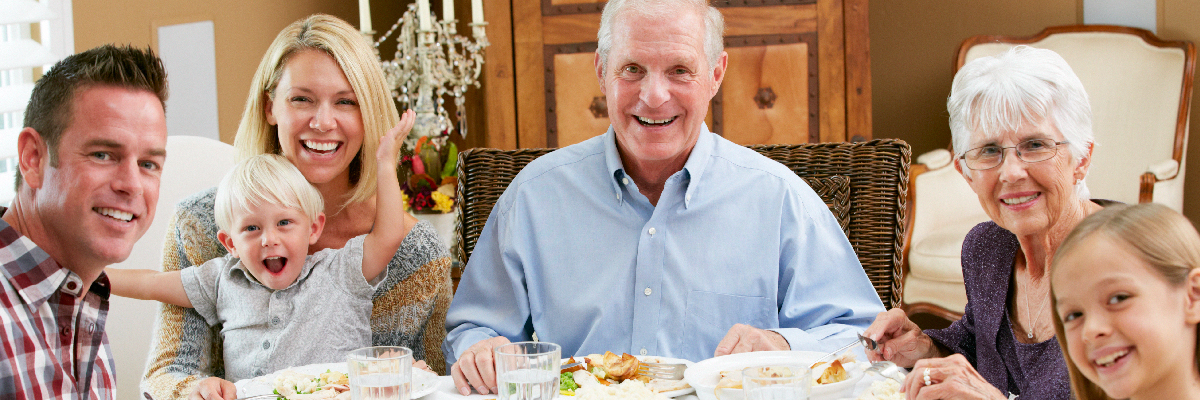
Article at a Glance
There is no such thing as a peaceful holiday meal when you have young children. Those days of leisurely enjoying your turkey are gone, especially if you have a toddler. But before you hyperventilate at the idea of sitting your two-year-old child down at your mother-in-law’s beautifully decorated table, here are some things you can do to help contain the collateral damage.
Timing
Small children have small bellies. Waiting to eat is not one of their strengths. But for most families you eat once the turkey is done and that often takes longer than you thought. So be sure to pack some healthy snacks to ward off the hunger.
If you can, try to eat during one of your regular meal times. That way you don’t have to worry about giving your kids too many snacks beforehand and having them not be hungry or not enough and having them be grumpy. Eating during nap is also not a good idea—unless you can get your little one to go to sleep while you enjoy your meal!
Pick Your Battles
Recognize that Thanksgiving dinner is probably not when you want to have a stand off over the green beans. Instead serve several healthy foods for the meal and let your child pick. This is just one meal; if your child doesn’t eat a whole serving of vegetables it is okay.
And there is no need to worry about how much food your child eats, whether during a holiday meal or anytime. Remember that kids will not starve themselves. Malnutrition is more likely to occur when parents offer unhealthy options to “fill” their kids up. When children fill up on things like chips and crackers they are more likely to miss out on the minerals and vitamins they need from other foods. It is good to remember that your job is to provide healthy food; it is your child’s job to decide how much to eat. If your toddler doesn’t eat anything and is hungry later, offer another healthy option at the next snack time.
If you don’t think your child is going to like anything on the menu, then bring some healthy options that she does like.
Plan Ahead
If there is some food you would like your toddler to eat, maybe your mother-in-law’s famous yams, try introducing it beforehand. Children often have to be exposed at least ten times to a new food before trying it. Don’t make it a power struggle, but serve it to your child and let your child see others eating it.
Bring Your Own Entertainment
Most toddlers don’t have the maturity or the temperament to sit at the table for very long. So you will want to bring some activities that will be easy to do at the table. New things are always exciting to children, and there are many fun things you can pick up at the store for a couple of dollars. Things like crayons, stickers, books, and games work well. You can also bring some toys for your child to play with by the table if they are too wiggly to sit still anymore. Most toddlers can sit still for about 20 minutes before they need to get up and move.
But think twice about handing your child your smartphone. When children are watching videos or playing electronic games, they tune out what is going on around them. Which means they aren’t interacting with family members, creating memories, or developing the skills they need later to sit politely at the dinner table.
Tag Team
If you want some time to enjoy your turkey in peace, swap off on who is in charge. You can rotate every 20 minutes or so with your spouse or another relative who is dying to spend time with your child. If things get out of hand, whoever is on duty can take your child out on a walk to get all the wiggles out.
If you are in charge of preparing the meal, make sure you have plenty of help with the kids and set realistic expectations about what you can get done. Asking for help with some of the food can be helpful.
Childproof
If your child is one who grabs first and asks questions later, it is a good idea to childproof your side of the table. Ask for plastic plates and cups for your child and keep the knives and any hot plates out of reach. And definitely keep great grandma’s crystal candlesticks far, far away.
It is also a good idea to dress your child comfortably. Ties and holiday dresses are great for photos, but are likely to make your child uncomfortable and grumpy at the dinner table. You will also be less stressed if you aren’t worried about them ruining their clothes.
Set Expectations
Toddlers don’t have a great reputation for being predictable and compliant, but they can understand basic expectations. Take a little time to tell your child what to expect and what kind of behavior will be expected. Depending on your child, going to somebody’s house or having lots of people over can be a frightening or overly exciting experience. Try talking about it beforehand or bringing a comfort item from home. It may not make your child a perfect angel, but it can help. Toddlers are still figuring out the world and getting a little direction helps.
You will also need to set your expectations. If you are lucky you are going to have over 70 Thanksgiving or Christmas meals in your lifetime. If a handful of those are less than ideal, it isn’t the end of the world. Be considerate of your guests or your host, but remember that they probably knew what they were getting into when they agreed to share a meal with you. Don’t expect things to be picture perfect. Just roll with it and remember that some day when you look back on it, it won’t seem as bad.